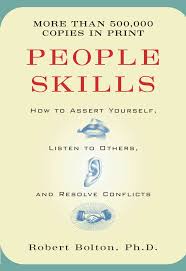Whitepaper Title: Mastering Assertiveness: A Guide Based on Robert Bolton's "People Skills"
Abstract:
This whitepaper offers a comprehensive guide to developing assertiveness, a crucial interpersonal skill for effective communication and conflict resolution. Drawing insights from Robert Bolton's renowned book "People Skills," the paper explores the key principles and techniques for expressing oneself clearly, directly, and respectfully while considering the needs and perspectives of others. Through practical examples and actionable steps, individuals can enhance their assertiveness, foster healthier relationships, and achieve personal and professional goals.
Keywords: assertiveness, communication, conflict resolution, interpersonal skills, Robert Bolton, People Skills
Introduction
Assertiveness, the ability to express oneself clearly, directly, and respectfully, is a vital interpersonal skill that underpins effective communication and conflict resolution. In today's fast-paced and interconnected world, mastering assertiveness is essential for building strong relationships, achieving personal and professional goals, and navigating the complexities of social interactions.
This whitepaper delves into the principles and techniques outlined by Robert Bolton in his acclaimed book "People Skills." By understanding the nuances of assertiveness and applying these strategies in practical settings, individuals can cultivate a more confident and fulfilling communication style.
The Importance of Assertiveness
Assertiveness plays a pivotal role in various aspects of life, including:
- Improved relationships: Assertive communication fosters mutual respect, understanding, and trust, leading to stronger and more harmonious relationships.
- Enhanced self-esteem: Expressing oneself confidently and honestly contributes to a positive self-image and increased self-worth.
- Effective conflict resolution: Assertive individuals can navigate conflicts calmly and constructively, finding mutually beneficial solutions.
- Career success: Assertiveness is often a prerequisite for leadership, negotiation, and effective teamwork in professional settings.
Understanding Assertiveness
Before delving into specific techniques, it is essential to clarify the concept of assertiveness. Assertiveness is distinct from aggressiveness and passivity. While aggressiveness involves dominating others and disregarding their feelings, passivity entails avoiding expressing one's needs or opinions. Assertiveness, on the other hand, strikes a balance between the two, allowing individuals to express themselves honestly and respectfully while considering the perspectives of others.
Key Principles from "People Skills"
Robert Bolton's "People Skills" offers a wealth of insights into developing assertiveness. Here are some key principles to guide individuals on their journey:
- Use "I" statements: Expressing feelings and needs using "I" statements helps avoid blaming others and fosters empathy. For example, instead of saying, "You're always late," say, "I feel frustrated when you're late."
- Be clear and direct: Avoid beating around the bush. State your needs or requests clearly and concisely.
- Listen actively: Show genuine interest in the other person's perspective by actively listening and seeking to understand their viewpoint.
- Practice assertive communication: Assertiveness is a skill that requires practice. Start with small steps and gradually build your confidence in expressing yourself.
Practical Techniques for Assertive Communication
- Broken record technique: Repeat your request calmly and persistently, even if the other person tries to deflect or ignore it.
- Fogging: Acknowledge the other person's criticism without becoming defensive.
- Negative assertion: Acknowledge the validity of the other person's negative statement while maintaining your position.
- Assertive inquiry: Ask clarifying questions to understand the other person's perspective and ensure effective communication.
Overcoming Challenges to Assertiveness
Individuals may encounter various challenges when developing assertiveness. Common obstacles include fear of rejection, guilt, or a lack of confidence. Addressing these challenges requires self-awareness, practice, and support from others.
Conclusion
Mastering assertiveness is a valuable investment in personal and professional growth. By following the principles outlined in Robert Bolton's "People Skills" and practicing assertive communication techniques, individuals can enhance their relationships, improve their self-esteem, and navigate challenges with greater confidence and effectiveness.
References
- Bolton, R. (2010). People Skills: How to Assert Yourself, Listen to Others, and Resolve Conflicts. Simon & Schuster.
Note: To enhance the credibility of your whitepaper, consider adding citations to specific examples or studies that support the information presented. You can use various citation styles (e.g., APA, MLA, Chicago) to format your references appropriately.



